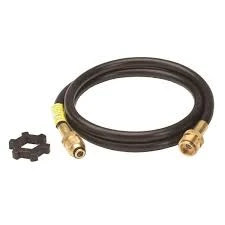High-Performance Rubber Hose for Safe Gasoline Transport and Storage Solutions
Dec . 24, 2024 20:18 Back to list
High-Performance Rubber Hose for Safe Gasoline Transport and Storage Solutions
The Importance of High-Quality Rubber Hoses for Gasoline Transport
When it comes to the safe and efficient transportation of gasoline, the choice of materials plays a crucial role in ensuring performance and safety. One of the key components in such operations is the rubber hose. Designed to handle the specific demands of gasoline transport, these hoses must meet stringent requirements to prevent leaks, withstand pressure, and endure the harsh chemicals often found in fuel. This article delves into the importance of using high-quality rubber hoses for gasoline applications, exploring their construction, benefits, and maintenance needs.
Construction and Materials
Rubber hoses designed for gasoline are typically crafted from specialized compounds that enhance their durability and resistance to degradation. The most common materials include synthetic rubbers such as nitrile (NBR) and chlorinated polyethylene (CPE). Nitrile rubber, in particular, is favored because of its excellent resistance to petroleum products and its ability to withstand high temperatures.
In addition to the rubber itself, the hoses are often reinforced with textile or steel to enhance their strength and flexibility. This reinforcement provides additional protection against crushing and kinks, which can lead to dangerous leaks. The hose's construction may also include layers to prevent external abrasions and environmental damage, thus ensuring a longer lifespan and improved performance.
Benefits of Quality Rubber Hoses
1. Safety First The transportation of gasoline involves inherent risks, including fire hazards and environmental concerns. High-quality rubber hoses are designed to mitigate these risks. They feature leak-proof connections and materials that can withstand aggressive chemicals and varying temperatures. This is paramount in preventing spills that could have catastrophic consequences on both human health and the environment.
rubber hose for gasoline

2. Versatility Rubber hoses for gasoline can be used in various applications, ranging from fueling stations to industrial settings and agricultural equipment. Their flexibility allows for ease of maneuvering and installation, making them an ideal choice for multiple scenarios. Whether it's for transferring fuel from tanks or connecting fuel lines, their adaptability is critical.
3. Durability and Longevity Investing in high-quality rubber hoses means investing in durability. Under normal conditions, these hoses can withstand years of use without significant wear and tear. They resist cracking, weathering, and hardening, which are common issues with lower quality hoses. This longevity translates to lower replacement costs and increased reliability.
4. Cost-Effectiveness While the initial investment in quality rubber hoses may be higher, the long-term benefits significantly outweigh these upfront costs. Fewer replacements, minimized downtime, and reduced risk of leaks can save businesses thousands of dollars over time. Additionally, the potential for avoiding fines and liabilities associated with environmental damage makes the case for investing in quality even stronger.
Maintenance and Care
To maximize the lifespan and effectiveness of rubber hoses for gasoline, regular maintenance is essential. Users should inspect hoses for signs of wear, such as cracks or leaks, regularly, especially in high-stress areas like bends and joints. Cleaning the hoses to remove any fuel residues can prevent deterioration and degradation of the material. Additionally, storing hoses properly when not in use—preferably coiled and out of direct sunlight—can mitigate environmental damage and prolong their usability.
Conclusion
In conclusion, rubber hoses are a critical component in the safe transport of gasoline. Their construction, materials, and design must meet specific industry standards to ensure safety, reliability, and durability. The benefits of using high-quality rubber hoses, including increased safety, versatility, durability, and cost-effectiveness, make a compelling case for investment in these specialized products. With proper maintenance and care, rubber hoses can provide a reliable solution for gasoline transport for years to come. As the industry evolves, the demand for superior materials and robust designs will undoubtedly continue to grow, underscoring the importance of quality in every aspect of fuel transportation.
